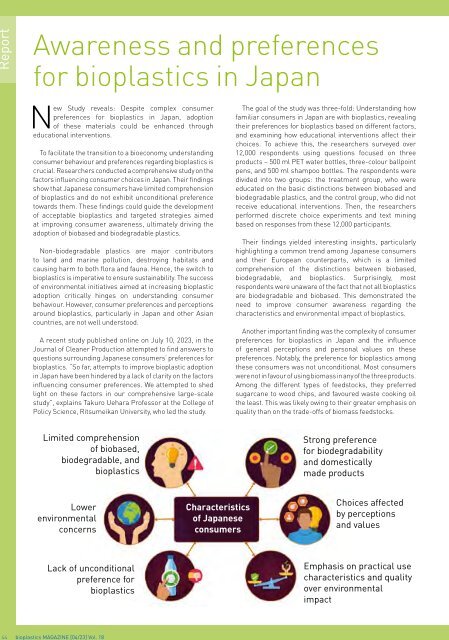Issue 04/2023
Highlights 100th issue Rebranding
Highlights
100th issue
Rebranding
You also want an ePaper? Increase the reach of your titles
YUMPU automatically turns print PDFs into web optimized ePapers that Google loves.
44 bioplastics MAGAZINE [<strong>04</strong>/23] Vol. 18<br />
Report<br />
Awareness and preferences<br />
for bioplastics in Japan<br />
New Study reveals: Despite complex consumer<br />
preferences for bioplastics in Japan, adoption<br />
of these materials could be enhanced through<br />
educational interventions.<br />
To facilitate the transition to a bioeconomy, understanding<br />
consumer behaviour and preferences regarding bioplastics is<br />
crucial. Researchers conducted a comprehensive study on the<br />
factors influencing consumer choices in Japan. Their findings<br />
show that Japanese consumers have limited comprehension<br />
of bioplastics and do not exhibit unconditional preference<br />
towards them. These findings could guide the development<br />
of acceptable bioplastics and targeted strategies aimed<br />
at improving consumer awareness, ultimately driving the<br />
adoption of biobased and biodegradable plastics.<br />
Non-biodegradable plastics are major contributors<br />
to land and marine pollution, destroying habitats and<br />
causing harm to both flora and fauna. Hence, the switch to<br />
bioplastics is imperative to ensure sustainability. The success<br />
of environmental initiatives aimed at increasing bioplastic<br />
adoption critically hinges on understanding consumer<br />
behaviour. However, consumer preferences and perceptions<br />
around bioplastics, particularly in Japan and other Asian<br />
countries, are not well understood.<br />
A recent study published online on July 10, <strong>2023</strong>, in the<br />
Journal of Cleaner Production attempted to find answers to<br />
questions surrounding Japanese consumers’ preferences for<br />
bioplastics. “So far, attempts to improve bioplastic adoption<br />
in Japan have been hindered by a lack of clarity on the factors<br />
influencing consumer preferences. We attempted to shed<br />
light on these factors in our comprehensive large-scale<br />
study”, explains Takuro Uehara Professor at the College of<br />
Policy Science, Ritsumeikan University, who led the study.<br />
The goal of the study was three-fold: Understanding how<br />
familiar consumers in Japan are with bioplastics, revealing<br />
their preferences for bioplastics based on different factors,<br />
and examining how educational interventions affect their<br />
choices. To achieve this, the researchers surveyed over<br />
12,000 respondents using questions focused on three<br />
products – 500 ml PET water bottles, three-colour ballpoint<br />
pens, and 500 ml shampoo bottles. The respondents were<br />
divided into two groups: the treatment group, who were<br />
educated on the basic distinctions between biobased and<br />
biodegradable plastics, and the control group, who did not<br />
receive educational interventions. Then, the researchers<br />
performed discrete choice experiments and text mining<br />
based on responses from these 12,000 participants.<br />
Their findings yielded interesting insights, particularly<br />
highlighting a common trend among Japanese consumers<br />
and their European counterparts, which is a limited<br />
comprehension of the distinctions between biobased,<br />
biodegradable, and bioplastics. Surprisingly, most<br />
respondents were unaware of the fact that not all bioplastics<br />
are biodegradable and biobased. This demonstrated the<br />
need to improve consumer awareness regarding the<br />
characteristics and environmental impact of bioplastics.<br />
Another important finding was the complexity of consumer<br />
preferences for bioplastics in Japan and the influence<br />
of general perceptions and personal values on these<br />
preferences. Notably, the preference for bioplastics among<br />
these consumers was not unconditional. Most consumers<br />
were not in favour of using biomass in any of the three products.<br />
Among the different types of feedstocks, they preferred<br />
sugarcane to wood chips, and favoured waste cooking oil<br />
the least. This was likely owing to their greater emphasis on<br />
quality than on the trade-offs of biomass feedstocks.<br />
Limited comprehension<br />
of biobased,<br />
biodegradable, and<br />
bioplastics<br />
Strong preference<br />
for biodegradability<br />
and domestically<br />
made products<br />
Lower<br />
environmental<br />
concerns<br />
Characteristics<br />
of Japanese<br />
consumers<br />
Choices affected<br />
by perceptions<br />
and values<br />
Lack of unconditional<br />
preference for<br />
bioplastics<br />
Emphasis on practical use<br />
characteristics and quality<br />
over environmental<br />
impact

















